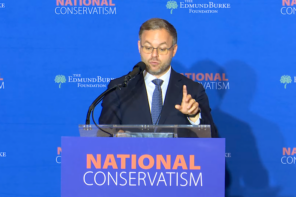This May, the Supreme Court’s Town of Greece vs. Galloway ruling allowed sectarian invocations at town meetings. But moderates assured us that that could mean any “sectarian.” As if to support this more fluid reading of the verdict, the first person that the Town of Greece, New York, actually invited to give an invocation was an atheist. At the time, that move seemed to me to be calculated to reveal something that many atheists stringently deny: that atheism has become, as I put it on Twitter, “just another sect.”
However, a recent development has me eating my words. In response to an apparently overwhelming number amount of requests by atheists to give invocations, the Town of Greece has recently changed their SCOTUS-approved policy to one that requires invocation-givers to be members of “assemblies with an established presence in the Town of Greece that regularly meet for the primary purpose of sharing a religious perspective.”
The standard of “established presence” is already shaky when it comes to town meetings. I grew up in a small town and was dragged to many town meetings as a child, my distinct impression being that idiosyncratic individuals expressing their opinion at length was exactly what town meetings were about. It’s even worse as a definition of religion. As my Twitter correspondent insisted grumpily, “atheist” simply means “one who believes that there is no deity,” and doesn’t necessarily imply anything about said atheist’s social or group identity, or established presence in the Town.
However, in possible anticipation of exactly the kind of dangerous limitation of public religious expression that the Greece ruling represents, atheist organizations have been successfully taking root in the U.S. religious scene. Apparently in Greece itself, atheists may fall on the “assemblies” list thanks, you guessed it, to their local branch of the Sunday Assembly. So, ok, fine.
It’s really the “religious perspective” part of Greece’s policy that should cause shivers in the heart of anyone who still believes in the separation of church and state. Are we really asking the government to decide, again, what is or is not a religion? Yes. In New York, atheists may be on the approved list. In Florida, they are precisely not just another sect. The Board of Commissioners in Brevard County, Florida, recently voted unanimously not to allow a representative of the Central Florida Freethought Community to give an invocation.
Such invocations are “…presented by members of our faith community….The prayer is delivered during the ceremonial portion of the county’s meeting, and typically invokes guidance for the County Commission from the highest spiritual authority, a higher authority which a substantial body of Brevard constituents believe to exist.”
Well, good for the substantial body of Brevard constituents. But that’s not the issue. The issue is the openness of public government to the beliefs and opinions of all its constituents. And requiring those beliefs to rely on a “higher spiritual authority” gets very dicey, very fast. What about Buddhism? Although generally considered a religion, it does not rely on belief in a specific “deity” or higher authority. Buddhism, writes theologian William H. Harrison in his recent book In Praise of Mixed Religions: The Syncretism Solution in a Multifaith World, is a “category-bender” that forces us to reconsider our criteria for what is a religion. Harrison would argue that Buddhism is certainly a religion—but then so is Marxism, capitalism, and neoliberalism. Most individuals—and certainly very few town councils—would not be comfortable going that far. Yet. But if we are going to ask government to define religion, we ought to at least define it as broadly as possible.
At the very least, the revisions to the Town of Greece ruling in New York and Florida show us a pattern: first equivocation, then letting true religious-right colors show. For anyone who believed Justice Samuel Alito’s assurance that the Hobby Lobby decision “should not be understood to hold that an insurance-coverage mandate must necessarily fall if it conflicts with an employer’s religious beliefs,” the Wheaton College exemption that followed less than 72 hours later swiftly undercut that moderation, sparking outrage from Justices Sotomayor and Ginsburg.
The Town of Greece verdict majority opinion contained a similar note of restraint from moderate Justice Kennedy, who voiced hope that Greece “would welcome a prayer by any minister or layman who wished to give one.” No such luck. With the Brevard verdict, it is Justice Kagan who looks prescient, when she wrote in her dissenting opinion, that the majority decision reflects an erroneous reading of religion itself: “I have no doubt that every member of this Court believes as firmly as I that our institutions of government belong equally to all, regardless of faith . . . the majority misjudges the essential meaning of the religious worship in Greece’s town hall, along with its capacity to exclude and divide.”




